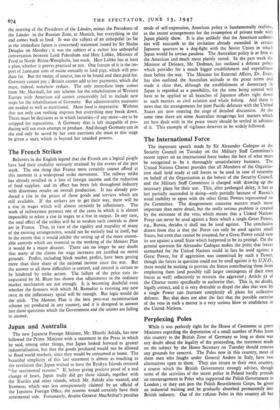The French Strikes
Believers in the English legend that the French are a logical people have had their credulity seriously strained by the events of the past week. The one thing that France most certainly cannot afford at this moment is a widespread strike movement. The railway strike has already resulted in a loss of foreign income and the reduction of food supplies, and its effect has been felt throughout industry with disastrous results on overall production. It has already pro- duced a rise in the prices of those goods and services which are still available. If the strikers are to get their way, there will be a rise in wages which will almost certainly be inflationary. The work of railwaymen presents one of the cases in which it is almost impossible to relate a rise in wages to a rise in output. In any case, the total effect of the strikes will be to weaken such controls as there are in France. That, in view of the rigidity and stupidity of many of the existing arrangements, would not be entirely bad in itself, but to the extent that it would inhibit the setting up of the more reason- able controls which are essential to the working of the Monnet Plan it would be a major disaster. There can no longer be any doubt that many of the claims for wage increases are justified on moral grounds. Profits, including black market profits, have been getting more than their share of the national income since the war. But the answer to all these difficulties is control, and control is certain to be hindered by strike action. The failure of the price cuts in- augurated by M. Blum has shown that adjustments to the ordinary market mechanism are not enough. It is becoming doubtful even whether the firmness with which M. Ramadier is resisting any new twist in the inflationary spiral will be enough.. But logic would do the trick. The Monnet Plan is the best post-war reconstruction scheme yet produced in any country, and it is designed to answer just those questions which the Government and the unions are failing to answer.


































 Previous page
Previous page